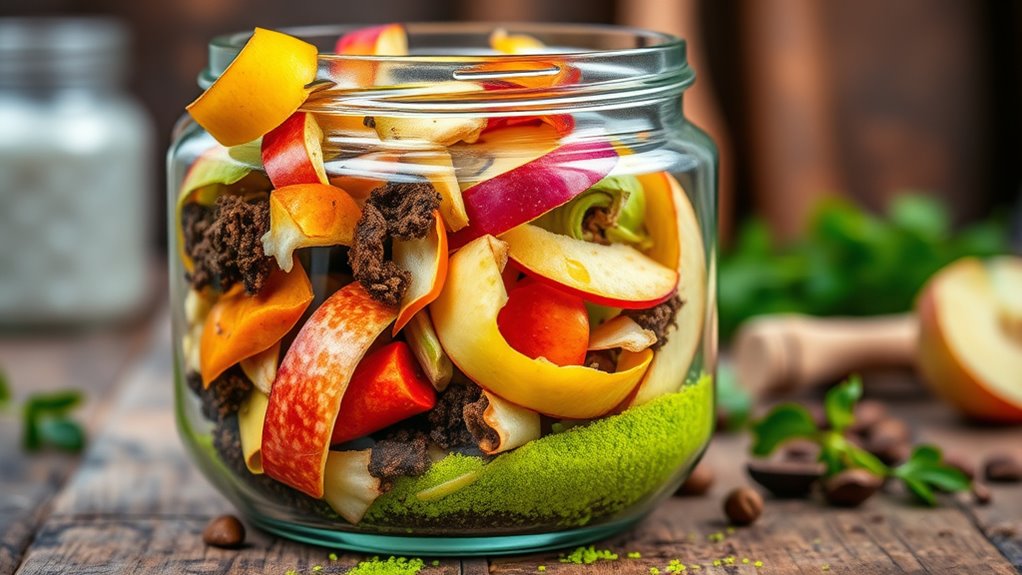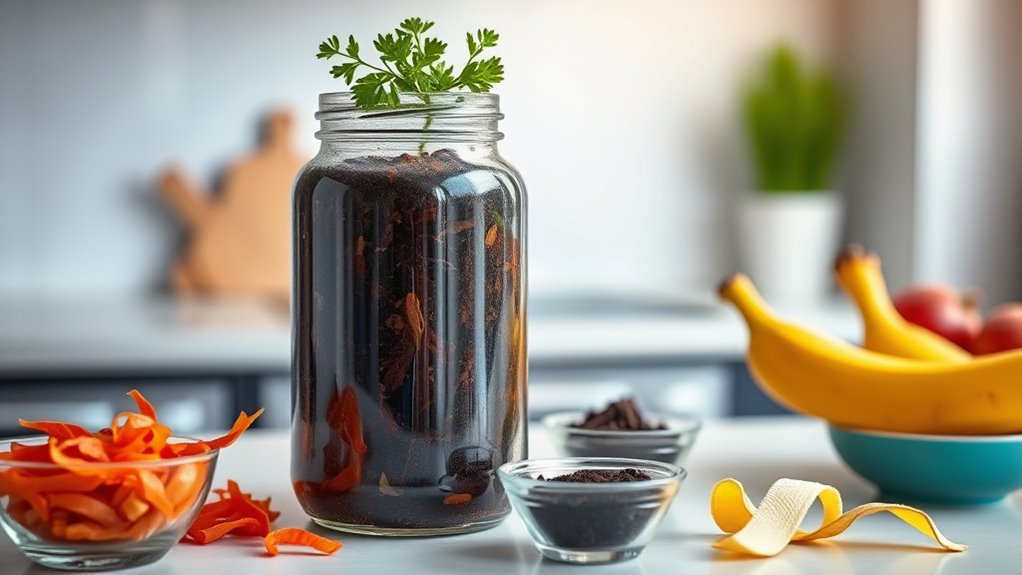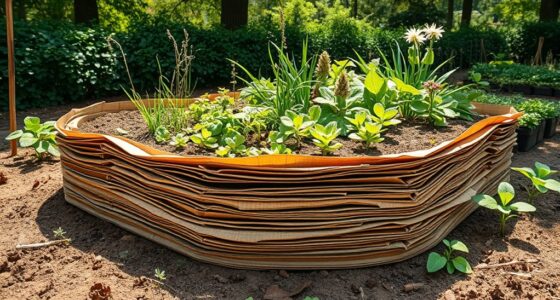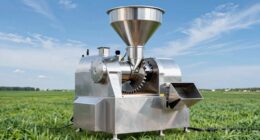To speed up your compost, add kitchen scraps rich in nitrogen like vegetable peels, coffee grounds, and eggshells, which energize microbes and boost heat production. Layer these with carbon-rich materials such as dried leaves or shredded paper to balance the pile. Regularly turn your compost to introduce oxygen and maintain temperature, ensuring microbes stay active. Keep an eye on temperature and moisture levels—if you’re curious about more tips, you’ll find methods to maximize microbial activity and accelerate your composting process.
Key Takeaways
- Add green kitchen scraps like vegetable peels and coffee grounds to boost nitrogen and microbial activity.
- Incorporate brown materials such as shredded paper or dried leaves to maintain balanced carbon levels.
- Regularly turn the compost pile to introduce oxygen, reheat, and accelerate microbial decomposition.
- Cover the compost to retain heat and moisture, creating optimal conditions for microbial activity.
- Use a compost thermometer to monitor and maintain temperatures between 130°F and 160°F for rapid composting.

Are you enthusiastic to speed up your composting process? If so, understanding how soil microbes and compost temperature work together can substantially boost your composting efficiency. Soil microbes are tiny, yet mighty, organisms responsible for breaking down organic matter into rich, fertile compost. They thrive when conditions are just right, especially in terms of temperature. By actively managing these factors, you can turn kitchen scraps into compost faster than you might expect.
The key to quick composting lies in fostering a healthy population of soil microbes. These microorganisms include bacteria, fungi, and other tiny decomposers that work tirelessly to break down food scraps, yard waste, and other organic materials. When you add kitchen waste like vegetable peels, coffee grounds, or eggshells to your compost bin, you’re providing a feast for these microbes. But simply adding scraps isn’t enough; you need to create an environment that encourages their activity. This means maintaining the right moisture levels and aeration, but most importantly, keeping an eye on compost temperature.
Compost temperature is a vital indicator of microbial activity. As microbes consume organic matter, they generate heat, causing the compost to heat up. Ideally, the temperature should reach between 130°F and 160°F (54°C to 71°C). This heat not only accelerates decomposition but also helps kill off weed seeds and harmful pathogens. When your compost is at the right temperature, it indicates that soil microbes are actively working, and your compost is processing efficiently.
To keep the compost temperature high, you can turn the pile regularly to introduce oxygen, which is essential for microbial respiration. Adding a balance of green materials (like vegetable scraps and coffee grounds) and brown materials (like dried leaves or shredded paper) helps maintain the right carbon-to-nitrogen ratio, fueling microbial activity. Also, covering your compost with a lid or tarp can help retain heat and moisture, creating a cozy environment for microbes to thrive.
Monitoring temperature with a compost thermometer is an effective way to gauge progress. When you see the temperature dropping, it’s a sign to turn the pile and add more green materials if needed. By paying attention to these details, you encourage soil microbes to stay active and keep the composting process moving swiftly. With a little effort, you’ll be surprised how quickly your kitchen scraps transform into nutrient-rich compost that will enrich your garden soil.
Frequently Asked Questions
Can I Use Expired Kitchen Ingredients as Compost Accelerators?
Yes, you can use expired kitchen ingredients as compost accelerators. Expired ingredients like coffee grounds, eggshells, or fruit peels can boost compost benefits by adding essential nutrients and microbes. Just make certain they haven’t gone moldy or rotten, which could harm your compost. Incorporating these ingredients helps speed up decomposition and enriches your soil, making your compost healthier and more nutritious for your plants.
How Often Should I Add Kitchen Waste to My Compost?
Did you know that adding kitchen waste every 2-3 days keeps compost active and healthy? You should follow general frequency guidelines by adding kitchen waste to your compost about twice a week. Stick to an addition schedule that balances greens and browns, ensuring proper breakdown. Regularly adding waste prevents odors and speeds up composting, so stay consistent and monitor your compost’s progress for the best results.
Are There Any Kitchen Items That Shouldn’T Be Composted?
You shouldn’t compost unwanted plastics or items containing toxic chemicals, as they can pollute your compost and harm plants. Avoid composting items like plastic wrappers, Styrofoam, and chemical-laden products. Also, steer clear of meat, dairy, and oily foods, which can attract pests and cause odors. Stick to organic kitchen waste like fruit and vegetable scraps, coffee grounds, and eggshells to keep your compost safe and effective.
What Is the Ideal Moisture Level for Compost Accelerators?
You might think compost accelerators need to be kept super moist, but the truth is, the ideal moisture level is about 40-60% water content. Proper moisture control is key—you’ll want enough water to keep microbes active without drowning them. Check your compost regularly, adding water if it’s too dry, and turn it to distribute moisture evenly. Maintaining this balance speeds up decomposition effectively.
How Long Does It Take for Kitchen-Based Accelerators to Work?
Kitchen-based accelerators typically start showing results within a few days to a week, but timing expectations depend on factors like ingredient types, moisture, and aeration. For best effectiveness, keep the compost moist and turn it regularly. If you maintain ideal conditions, you’ll notice faster decomposition, usually within a week. Remember, patience and proper management are key to maximizing the effectiveness of your kitchen compost accelerators.
Conclusion
By using simple kitchen scraps as compost accelerators, you’re planting seeds of sustainability right at home. Just like a tiny spark ignites a blazing fire, these small actions can ignite a larger change in how you care for the planet. Your efforts transform leftovers into nourishing soil, symbolizing growth and renewal. Keep nurturing your compost, and watch how your eco-conscious choices bloom into a greener, more vibrant world around you.










